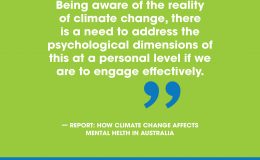The impact of climate change on mental health is emerging as a key area in the study of climate change and health, which is appropriate given that the psychological impacts of any form of disaster can greatly outstrip the physical injury. The very significant impact of climate change on mental health exacerbates the already existing global under-investment in mental health.
Mental health consequences of climate change can be:
- Direct: It is well documented that climate change is contributing to an increase in extreme weather events such as cyclones, floods and bushfires. The link between these types of events and mental illness is also well established. Psychological distress can manifest in many ways in individuals and communities exposed to these conditions, such as increased domestic violence, alcohol and substance abuse, and in some cases may result in mental illnesses such as PTSD, anxiety disorders, depression and increased suicide.
- Indirect: resulting from subacute and chronic changes in climate such as drought, sea-level rise and biodiversity loss, which results in damage to physical and social infrastructure, food and water shortage, physical health effects, loss of income, forced migration, conflict and displacement. Indirect consequences are understudied and their extent can be hard to quantify. Australian research has identified an increase in suicide in rural farming communities following prolonged drought.
- Overarching: The mere awareness of the looming threats, risks and impact of climate change presents challenges to our emotional and social well-being. The term “psychoterratic syndrome” has been coined to describe the specific emotional responses to climate change and environmental degradation. This includes phenomena such as eco-anxiety, eco-paralysis and solastalgia, which is the emotional response to the negative transformation of a loved home environment. Vicarious threats are experienced by many and can result in feelings of helplessness, loss and frustration.
Across all of these areas, vulnerable groups are more likely to be affected, such as those with pre-existing mental illness, those from poor socio-economic circumstances, indigenous peoples, the young and the old.
Children and adolescents are especially vulnerable to mental illness and distress as a result of climate change and experience PTSD, anxiety, phobias, sleep disorders, attachment disorders and substance abuse. This can impact the developmental trajectory and can result in learning difficulties, cognitive and language delays and difficulties with emotional regulation. Many young people experience hopelessness, despair and anger, they are fearful of what the future holds and that the world will end in their lifetime.
Activists and scientists expert in the field advocating for the mitigation of climate change and environmental degradation are often working against resistance and sometimes open hostility. They are at risk of burnout as well as feeling overwhelmed, hopeless and frustrated. This has been described as ‘pre-traumatic stress’, in that they are dealing with evidence and predictions of frightening realities on a daily basis. These groups are prone to feelings of inadequacy, poor self-care, depression and anxiety. Tasmania has comparatively high proportions of both activists and scientists due to the long history of environmental activism here, and the presence of UTAS, CSIRO, IMAS and the Australian Antarctic Division in the state.
There are challenges in attributing mental health impacts to climate change; responses are complex and varied; psycho-social implications from both extreme weather events and slower environmental changes emerge over wide ranging timeframes. The interaction between mental health and social determinants of health occurs via complex causal pathways, many of which can be traced back to distal but potent, root causes such as famine, war, and poverty, all of which are accelerated by climate change.
Links to overviews of the mental health impacts of climate change
Climate change anxiety and our mental health: Susie Burke and Grant Blashki
Further information can be found on our resources page




